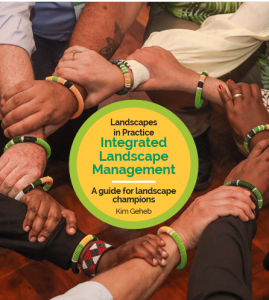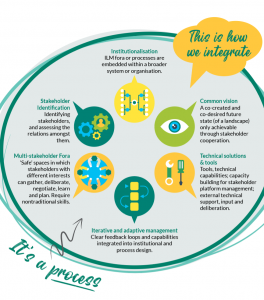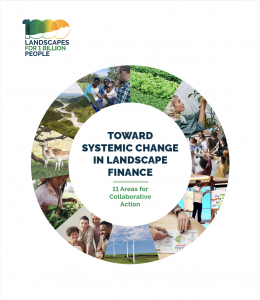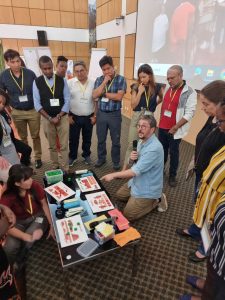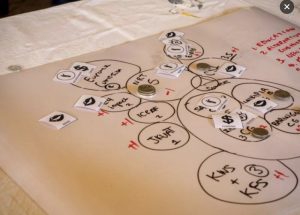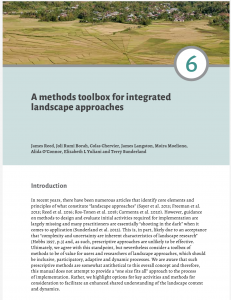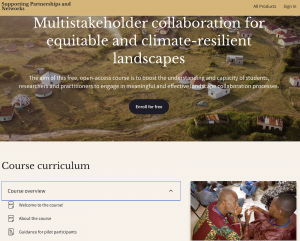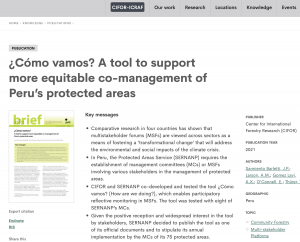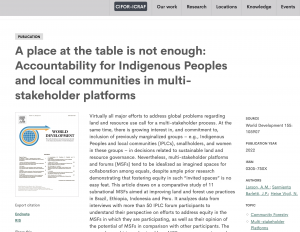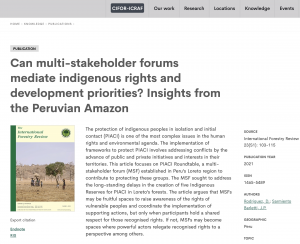Category: Knowledge
Landscapes in Practice: our ILM overview
Landscapes in Practice is a new series of practitioner guides to facilitate implementation of the six core dimensions of lntegrated Landscape Management (ILM). In this introductory brief, we provide an overview of what ILM is – in particular, how we have approached the concept – and the reasons why it is needed.
Landscapes in Practice: Our guides for landscape champions
The Central Component is tasked with synthesizing and disseminating knowledge and lessons from Landscapes For Our Future's 22 projects. Our new series of practitioner guides aims to do just that in order to facilitate implementation of what we propose are the six core dimensions or elements of landscape approaches.
Toward systemic change in landscape finance
New financial pathways have the power to channel more meaningful and integrated investments in landscape-level initiatives. This report sources ideas and solutions from leading experts in the field on the steps needed to scale up integrated landscape finance (ILF) for the benefit of people and planet.
Playtime! Teaching the pros (and cons)
Our programme's Global Summit brought together more than 50 ILM practitioners to explore the inner workings of an integrated approach to landscapes management. But how to bring everyone to a common understanding of these principles?
The Centrality of Power
An at-a-glance summary of a session at the global summit that explored the issue of power within Integrated Landscape Management.
A methods toolbox for integrated landscape approaches
This chapter aims to give guidance for those working within integrated landscape approaches. It suggests key points for consideration to allow those involved to have a better understanding of the landscape context and dynamics.
Free multistakeholder collaboration course
This free course from Supporting Partnerships and Networks, is aimed at anyone who is involved in working within multistakeholder fora, where solutions are sought for complex sustainability problems.
¿Cómo vamos? A tool to support more equitable co-management of Peru’s protected areas
This brief presents the findings of an assessment conducted in Peru to understand and verify the adoption, outcomes, and potential impacts of the participatory reflective monitoring tool called "¿Cómo vamos?" (How are we doing?) in multistakeholder forums (MSFs). MSFs are recognized as a means of fostering transformative change to address the environmental and social impacts of the climate crisis. In Peru, the Protected Areas Service (SERNANP) mandates the establishment of MSFs or management committees (MCs) involving various stakeholders in the management of protected areas. The tool was co-developed and tested by CIFOR and SERNANP with eight MCs. The positive reception and interest in the tool led SERNANP to publish it as an official document and require its annual implementation by the MCs of its 75 protected areas. This assessment provides insights into the adoption, outcomes, and potential impacts of the tool in Peru.
A place at the table is not enough: Accountability for Indigenous Peoples and local communities in multi-stakeholder platforms
This article explores the challenges of achieving equity in multi-stakeholder platforms and forums (MSFs) focused on sustainable land and resource governance. Drawing on a comparative study of 11 subnational MSFs in Brazil, Ethiopia, Indonesia, and Peru, the article examines the perspectives of Indigenous Peoples and local communities (IPLCs) who participate in these forums. The research aims to understand how MSFs can ensure voice, empowerment, and address inequality, while being accountable to the needs and interests of IPLCs. The findings highlight the optimism of IPLC participants but also reveal accountability failures. The article argues for greater strategic attention to how marginalized groups perceive their participation in MSFs and proposes ways to foster collective action and hold more powerful actors accountable to achieve equality, empowerment, and justice.
Can multi-stakeholder forums mediate indigenous rights and development priorities? Insights from the Peruvian Amazon
This article examines the role of a multi-stakeholder forum (MSF) called PIACI Roundtable in protecting indigenous peoples in isolation and initial contact (PIACI) in Peru's Loreto region. The MSF aimed to address delays in establishing Indigenous Reserves for PIACI. The article highlights the potential of MSFs to raise awareness and coordinate actions for vulnerable groups, but emphasizes the importance of shared respect for recognized rights among participants. Without such respect, MSFs may prioritize other perspectives over the rights of marginalized communities.


